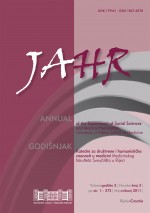CROADA – our experience in fight against doping in sport
Keywords:
doping, sport, ethics, WADA, CROADAAbstract
Athletes are often tempted to take prohibited agents with the aim of performance enhancing because of diff erent pressures they face, including self-affi rmation, the infl uence of money- and glory-driven parents, coaches and community members. Th ese agents increase body mass and power, relieve fatigue, mask other prohibited substances during testing, lead to faster recovery and have many other adverse eff ects on health. Th e use of prohibited agents, com-monly known as doping, is detrimental to the mental and physical health of athletes and violates the rules of ethical conduct. Th e prohibited agents include prohibited substances and prohibited methods. For a substance or a method to be included on the Prohibited List published by the World Anti-Doping Agency (WADA) it has to meet at least two of the fol-lowing three criteria: it enhances sport performance, it represents an actual or potential health risk to athlete or it violates the spirit of sport. Th e fi ght against doping has, for a long time, been a strategic goal at both national and global level. Countries, the International Olympic Committee, international sport federations, national sport associations and various govern-ment and non-governmental organizations have been making considerable eff orts in creating policies and strategies for the fi ght against doping in sport. In 1999 these eff orts resulted in the establishment of the World Anti-Doping Agency (WADA). Subsequently, many of the national anti-doping agencies were founded. Croatian Anti-doping Agency (CROADA) was founded in 2007 with the aim of promoting doping-free sport and protecting athletes from adverse health eff ects.
Downloads
Published
Issue
Section
License
Authors who publish with this journal agree to the following terms:
- Authors retain copyright and grant the journal right of first publication with the work simultaneously licensed under a Creative Commons Attribution License that allows others to share the work with an acknowledgement of the work's authorship and initial publication in this journal.
- Authors are able to enter into separate, additional contractual arrangements for the non-exclusive distribution of the journal's published version of the work (e.g., post it to an institutional repository or publish it in a book), with an acknowledgement of its initial publication in this journal.
- Authors are permitted and encouraged to post their work online (e.g., in institutional repositories or on their website) prior to and during the submission process, as it can lead to productive exchanges, as well as earlier and greater citation of published work (See The Effect of Open Access).



